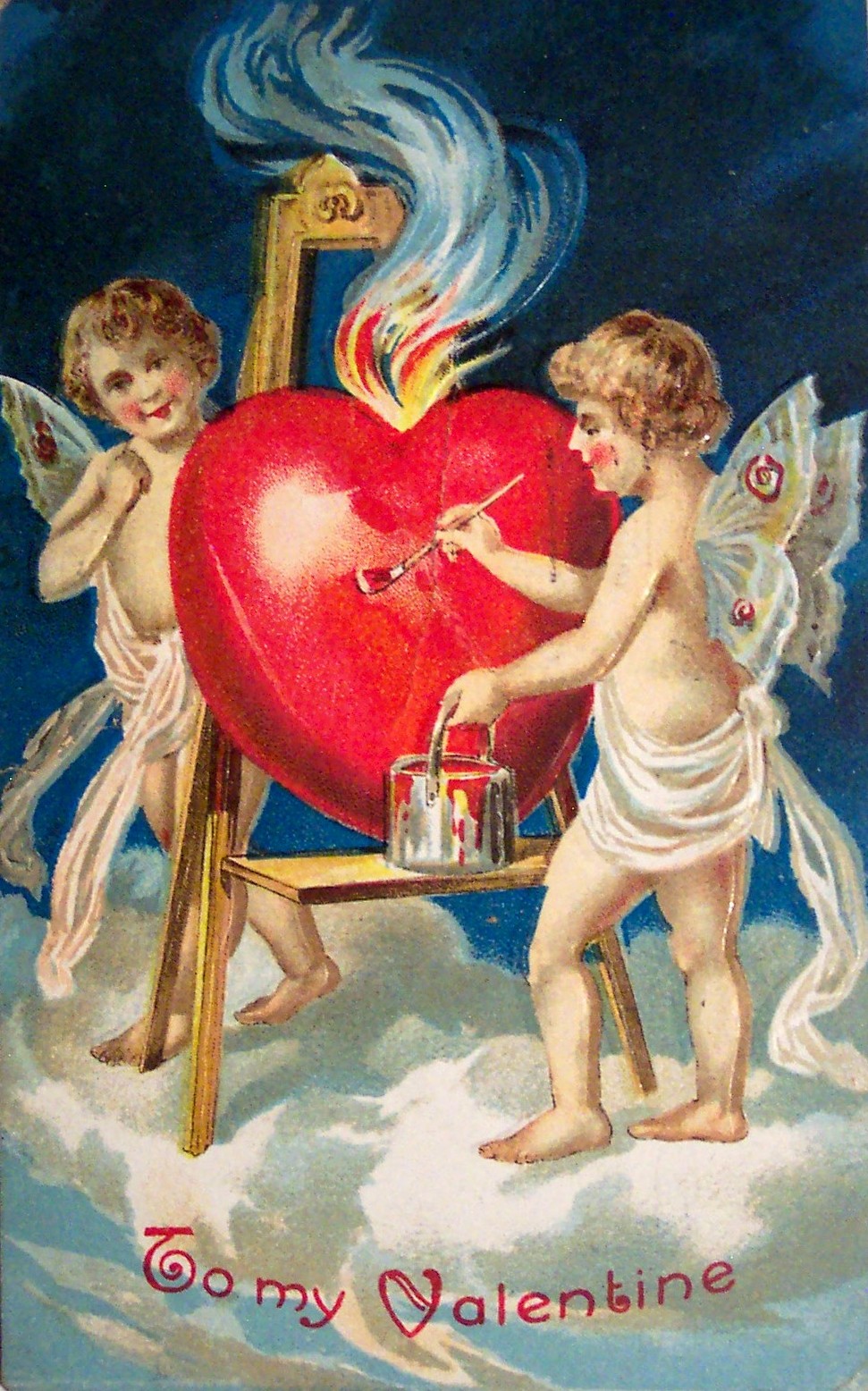Happy Valentine’s Day!
What *is* this day we celebrate every February 14th with cards, chocolates, flowers and words of love? Believe it or not, this day of love is not something drummed up by modern culture. In fact it’s been around for hundreds of years. There is not one specific Saint Valentine that can be attributed to the holiday as the Catholic Church recognizes three sainted Valentine’s, all martyred. Here is where legends come in to form where the celebration of love was derived on this saint day.
One legend states that in Rome, Emperor Claudius II (3rd century) banned young men from marrying so he could use them as soldiers to fight his wars. A local priest named Valentine rebelled by secretly marrying young couples in love. When his treachery was discovered, he was executed.
Yet, another legend decrees that Valentine while in prison sent the first Valentine’s card himself to a woman who was his beloved, and signed it, “From Your Valentine”.
Why February? Some suggest it is because this is the anniversary of Valentine’s death. Others say that it is because when the Roman’s were trying to convert Pagans to Christianity, they chose a date that coincided with the Lupercalia Festival (a festival celebrated between February 13th and 15th that was meant to chase away evil spirits to release health and fertility.) Judging from how many Christian holidays and saint days fall on or around Pagan celebration days, it would be my guess that the latter was the beginning of it, and the legends created afterward—but that is only my opinion.
It was in the year 498 A.D., Pope Gelasius declared that February 14th was Saint Valentine’s Day.
It is said prior to Chaucer that links to Saint Valentine and February celebrations were mostly about sacrifice and not love. In 1382, Chaucer recorded what is noted as the first indication of Valentine’s Day being romantic. Now, is that to say that there were not previous stories told? No. It just means this is the first piece recorded and used as evidence of an origin date. The problem with history is that we are only as good as the facts we have on hand…
Here is what Chaucer wrote in Parlement of Foules (yr. 1382):
“For this was on seynt Volantynys day
Whan euery bryd comyth there to chese his make.”
(Translates as: For this was on Saint Valentine’s Day, when every bird comes there to choose his mate.”)
Perhaps this is where we get the term, “love birds”?
The oldest Valentine’s Day card still in existence today, was written by Charles, Duke of Orleans, in 1415. He wrote the poem for his wife while imprisoned in the Tower of London after the Battle of Agincourt (French and English battle took place in Agincourt, France—English, by what some deem a miracle, won.). The card can be seen at the British Library in London, as part of the manuscript collection. Here is an excerpt:
Je suis desja d'amour tanné
Ma tres doulce Valentinée...
(Translates as: I am already sick of love, my very gentle Valentine.)
Shakespeare, in the 16th century, even noted the love-day holiday in his play, Hamlet (Act IV, Scene 5)
To-morrow is Saint Valentine's day,
All in the morning betime,
And I a maid at your window,
To be your Valentine.
Then up he rose, and donn'd his clothes,
And dupp'd the chamber-door;
Let in the maid, that out a maid
Never departed more.
In the 17th century Valentine’s Day became even more popular, another chance for not only courtly love to endure, but every one to celebrate love and romance. By the 1700’s pre-made cards became available for purchase. In strict contrast to the romantic period of the 15th and 16th centuries, during the 18th and 19th centuries, expressing ones emotions was frowned upon. Cards that were already made with devotions and admonishments were eagerly grabbed up and given to those who wanted to share romance and love.
In the 1840’s mass-printed Valentine’s Day cards became available in the United States when Esther A. Howland created her beribboned, laced cards.
One of my ALL TIME favorite poems about love was written by Elizabeth Barrett Browning (and one of the reasons I took 18th and 19th century Lit in college), here it is:
How Do I Love Thee? (Sonnet 43)
How Do I Love Thee? Let me count the ways.
I love thee to the depth and breadth and height
My soul can reach, when feeling out of sight
For the ends of Being an ideal Grace.
I love thee to the level of everyday's
Most quiet need, by sun and candlelight.
I love thee freely, as men strive for Right;
I love thee purely, as they turn from Praise.
I love thee with the passion put to use
In my old griefs, and with my childhood's faith.
I love thee with a love I seemed to lose
With my lost saints,- I love thee with the Breath,
Smiles, tears, of all my life!- and, if God choose,
I shall but love thee better after death.
So, for those of you who are skeptics that Valentine’s Day was created to make those in the flower, chocolate, card and jewelry business money, YOU’RE WRONG. While those industries may very well benefit every February, this traditional holiday of expressing one’s romantic feelings dates back hundreds and hundreds of years. For those of you who can’t wait to find the perfect card, or to write the most wondrous poem, I bow to you. Keep the tradition alive and celebrate love to the fullest! But most of all, celebrate that we have the ability to love, and that in this modern age, we can voice it if we want to.
Happy Valentine’s Day! What will you do on this special day?

No comments:
Post a Comment